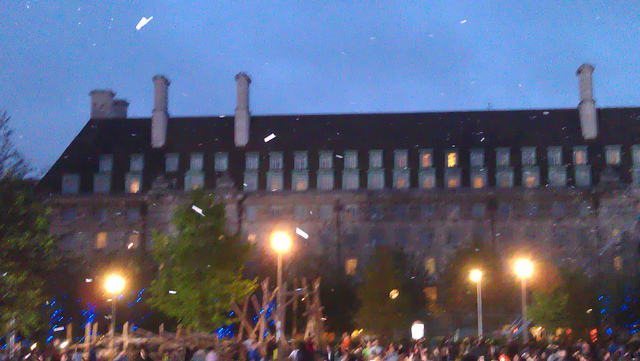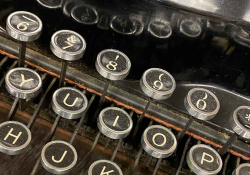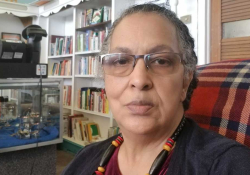Olympic Tributes to Literature

Southbank Centre’s Poetry Parnassus partnered with Chilean arts collective Casagrande in the “Rain of Poems,” dropping 100,000 bookmarks featuring the work of three hundred poets over London from a helicopter.
My last piece, “How Literature Saved the Olympics,” proved the Olympics owe their every breath to literature. But that doesn’t mean you can blame us for the hour you spent watching the gold medal round in men’s individual trampoline. Yes, that is a real thing.
Anyway, I’m writing now to tell you that while it might appear the International Olympic Committee (IOC) has divorced one of the foundational ideals of the competitions at Olympia, they haven’t—they only starved it for a few decades. But sometime before 2004 the IOC recognized the deficiency and, starting with the games at Athens, began proffering tributes to its literary saviors.
I’ll begin by admitting what I just told you is a lie. A bit of poetry made a brief appearance at the closing ceremony of the 1984 Los Angeles games when actor Richard Basehart read from Pindar’s “Pythian Ode 8”:
Creatures of a Day! Man is merely a shadow of a dream. But when god-given glory comes upon him in victory, a bright light shines upon us, and our life is sweet. When the end comes, the loss of flame brings darkness. But his glory is bright forever.
But that doesn’t count for four reasons. First, it was a random recitation of only two lines; a pittance of Pindar, if you will. Second, it’s not even an accurate translation. Compare that version to the one below; you’ll notice lines have been removed and even added–notice the different ending that, unfortunately, is less applicable to the 1984 LA games:
Creatures of a day. What is someone? What is no one? Man is the dream of a shadow. But when the brilliance given by Zeus comes, a shining light is on man, and a gentle lifetime. Dear mother Aegina, convey this city on her voyage of freedom, with the blessing of Zeus, and the ruler Aeacus, and Peleus, and good Telamon, and Achilles.
And notice this is a Pythian ode. The Pythian games were held every two years before and after the Olympic games. So, if we’re being literal, the Pythian games would more accurately correlate with the Winter Olympics. Finally, this was the closing ceremony featuring an inexplicable appearance of a flying saucer and an alien who traveled to Earth to deliver this important message: “For one hundred years you have celebrated the best that humanity has to offer. You call it the Olympic Games. And for that, and for the city which has kept the Olympic ideal alive, I salute you.” So that was our first contact with alien life. They traveled across the universe to tell us that? I always thought that first interaction would be a bit more, I don’t know, necessary.
So we’re going to throw the whole bizarre incident out. Forget the mangled Pindar and the intergalactic failure. Moving on.
A legitimate use of poetry was finally included in the 2004 Athens games. The beginning of Pindar’s “Olympian Ode 8” was inscribed on the back of each medal: “Mother of golden-crowned contests, Olympia, queen of truth!” And the closing ceremony featured the Pindaric “Ode to Athens” by Armand D’Angour.
Each Olympic games has featured poetry in one of its ceremonies (opening or closing) since 2004. The 2006 games in Turin, Italy, featured Yoko Ono reading “Imagine Peace,” an original free-verse poem inspired by John Lennon’s “Imagine”; the 2008 games in Beijing featured a skit with schoolchildren chanting poetry; and no one can forget spoken-word poet Shane Koyczan’s “We Are More,” the tribute to Canada he performed at the opening ceremony of the 2010 Vancouver games. This line from Koyczan’s performance rings in my head: “We dream so big there are those that would call our ambition an industry.” I can’t say if that’s true of Canada, but it sounds nice.
And although it was merely inspired by the 2008 Olympic campaign “Amazing Awaits” and not included in any part of the games, I want to mention Dr. Maya Angelou’s poem “Amazement Awaits” because it is amazing . . . and awaiting your attention. Here’s a video of her reading.
This year’s London games have been the biggest year for poetry:
Southbank Centre’s Poetry Parnassus, the UK’s largest ever poetry festival that brought together hundreds of poets from around the globe, partnered with Chilean arts collective Casagrande in the “Rain of Poems,” dropping 100,000 bookmarks featuring the work of three hundred poets over London from a helicopter. (Here’s a fun side note: WLT contributor David Shook was the Translator in Residence for the Poetry Parnassus. He covered the event for the Poetry Foundation, linked here.)
London mayor Boris Johnson read another commissioned Pindaric poem by Armand D’Angour (you’ll remember him from his 2004 poem “Ode to Athens”) at a gala for the IOC, and the city of London sponsored an Olympic-themed poetry competition for children. Fifteen-year-old Fope Jegede’s “The Champion’s Story” won gold.
Perhaps the greatest tribute to literature at the Olympic games is a collection of permanent art installations etched with poetry and placed throughout Olympic Park. Created by Winning Words, a poetry initiative of Forward Arts Foundation, the project features the work of poet laureate Carol Ann Duffy, John Burnside, Caroline Bird, Jo Shapcott, Lemn Sissay, and, most notably, the last line of Tennyson’s “Ulysses” on the Athlete’s Wall in the center of the village: “To strive, to seek, to find, and not to yield.”
Chosen from a batch of publicly nominated poems, this snippet of inspiration was selected by a panel of judges because it captured the true spirit of the games. I have to agree.
The London games also saw a few other notable literature-inspired happenings, including the Scottish Poetry Library and BBC’s sponsoring of the Written World project, which is broadcasting poems from each of the 204 participating nations during competition, and a Winning Words interactive poetry game featuring Olympic- and Paralympic-inspired poems.
We’re still a long way from the Olympic competitions being a joint showcase for the world’s most able bodies and agile minds, but the London games have proven that the Olympic concept of the interconnectivity of art and sport isn’t lost on the IOC, not entirely.
John Tyler Allen is a freelance writer in New York City.
For Further Reading
Peter Armenti, “Pindar, Poetry, and the Olympics,” Library of Congress, 27 July 2012.
“London 2012 Poetry Competition Entries.”
Tom Payne, “London 2012 Olympic Poetry: Winning Words,” The Telegraph, 26 July 2012.
Matt Pickles, “Olympic Ode Lends Touch of Classics,” University of Oxford, 23 July 2012.









